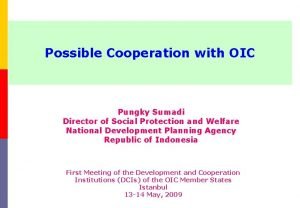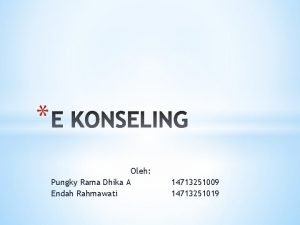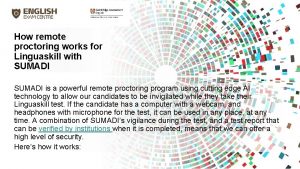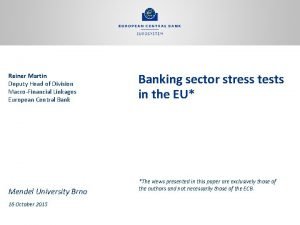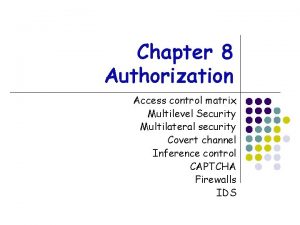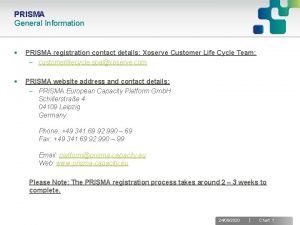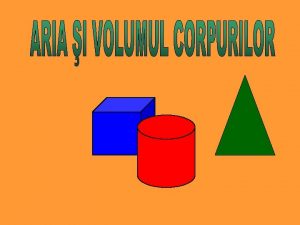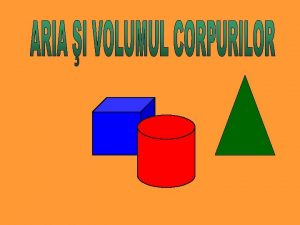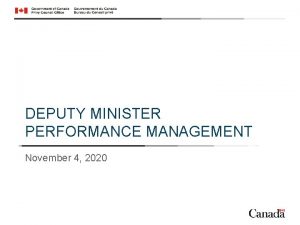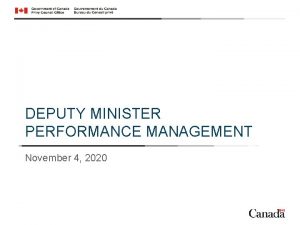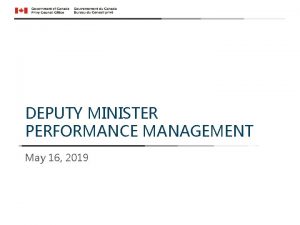What is PRISMA Pungky Sumadi Deputy Minister for











- Slides: 11

What is PRISMA? Pungky Sumadi Deputy Minister for Population and Labor Affairs 3 April 2018 CDD Conference, Colombo Sri Lanka

Project Background • 28 October 2013 – 31 December 2018 • AUD 77 million = US$59 million • Implementing Agency • Government of Indonesia : Bappenas • Government of Australia : Department of Foreign Affairs and Trade • Objective : • To increase by 30% the net incomes of 300, 000 smallholder farming households • Project Location • Eastern Indonesia : East Java, West Nusa Tenggara, East Nusa Tenggara, Papua, West Papua

Who We Are • PRISMA offers win-win agricultural solutions that provide profitable opportunities for co-investors while benefiting farmers at the same time • PRISMA helps spur growth along the value chain by reducing constraints and barriers to farmer productivity, performance and market access.

What PRISMA Offers Innovative & durable business solutions Risk sharing in implementing these solutions Mediation between market players To foster more profitable & effective working relationships Assessments On growthconstraining factors in the agriculture sector Helping to improve market efficiency

Design of Local Economic Development/ Livelihoods Component • PRISMA is a Market Systems Development program • Background analysis are conducted to design its interventions • Sector analysis – to understand how the sector works, why is it not performing optimally. • high numbers of poor people • opportunity for the poor to improve their position in society • reasonable feasibility of bringing about change in the sub-sector. • Stakeholder analysis • • Supply – demand of the market Private Sector, Public Sector, Civil Society Supporting functions Rules • Competitiveness analysis – analysis of market players, market potential, market failures

Design of Local Economic Development/ Livelihoods Component (2) • Types of interventions – With the private sector, PRISMA develops new or improved business models focusing on particular markets (different to value chain interventions). • Methods include : Demonstration plots, social marketing, market storms, good agriculture practice training, marketing • Access to finance (value chain financing) to support the development of farmers’ businesses • Linkages to buyers and suppliers • Measures to ensure profitability and commercial viability of the project • Embedding MSD in core business not CSR! • Providing business services such as market analysis, business plans/strategies, • Planning and tracking of the profitability • Scale and sustainability • Sustained take up of innovations by initial partners • Crowding in of more market actors expand coverage of innovation to benefit more people in the sector (and beyond) • Wider systemic change locks in innovations , supporting and promoting further expansion and strengthening resilience and longevity of sector • Embedding market systems development thinking and practices across Indonesia to ensure institutionalisation of more sustainability and scale oriented approaches.

Results KPI tracking Actual cumulative Y 17 S 2 Actual Y 17 S 2 1 # Outreach (all farm HH) 144, 063 66, 367 1 b # Outreach (<$2. 50 PPP) 100, 240 45, 630 2 Net Income Impact in IDR (all farm HH) 688, 105, 546, 926 477, 938, 447, 377 2 b Net Income Impact in IDR (<$2. 50 PPP) 480, 396, 958, 096 320, 024, 564, 196 3 # ISPs 1, 355 224 4 Increased Turnover ISPs in IDR 175, 165, 232, 658 85, 317, 226, 934 5 # Innovations/Interventions 115 26 6 # Initiatives by Government to improve BEE 21 11 7 # Intervention Partners (public & private sectors) 107 30 8 Private Partner co-investment in IDR 37, 115, 328, 704 11, 269, 750, 472 9 Value of additional investment by farmers 125, 874, 189, 197 61, 456, 957, 473

Case study – How MSD works in practice – pig pen to pork industry SMALLHOLDERS (BEFORE) § Ibu Maria owned 1 -2 few pigs since 2011 § Spent 4 -5 hours/day collecting and preparing local feed § 2 years to fatten piglets to adult size (70 -100 kg), sold at IDR 2 m SMALLHOLDERS (AFTER) § Shaded, watered pen, cleaned twice a day § Spends less than 90 min/day feeding and cleaning pigs § 3 -4 months for piglets to fatten to marketable size, sells at IDR 3 -4 m BREEDERS § Bruder Luci introduced new water supply, high quality feed, improved breeding practices, regular cleaning § Sell piglets and provides husbandry advice to 1, 100+ famers RETAILERS § Ibu Regina sells pig feed and provides husbandry info § Sales increased from 250 -500 kg to 5 -20 tonnes/month in 2 years INTERVENTION § Breeders and farmers to invest in improved breeds and husbandry practices, supported by local vets § Provision of info about healthier pens and fatten using high-quality commercial feed § Feed companies to supply quality feed mixes and info, through breeders, credit union and retailers § Hog Cholera outbreak – Support from Livestock Agency from District to National level

Case Study : Public Private Coordination for better UPSUS (Govt Subsidy) planning Private companies shared data base on their existing customers and operating areas • • • Subsidy program plan 2017 GAP training plan for subsidy recipients Free market expansion plan

Challenges and Lessons Learned Challenges Lessons learned • Needs in-depth analysis to understand the root problems • The market systems approach is proving to be effective in Indonesia • Needs high quality people – people with business backgrounds rather than CDD. • Facilitation requires time and patience • Failures in MSD interventions especially in the agriculture sector are common. Private sector pulls out, crop failure, etc. Embrace the failure - PRISMA tolerates a failure rate of 30% of its interventions. • Results/outcome oriented. • Rules/regulations that hinders market systems development – subsidies, trade restrictions • Finding a partner that is interested and committed to work together with PRISMA. • Use rigorous evidence and results based portfolio management • Retain as much flexibility as possible • Understand stakeholder requirements and tailor communications • Supporting public policy where opportunities arise • Support leadership and culture • Human resources talent is the vital ingredient

Thank you!
